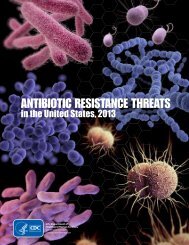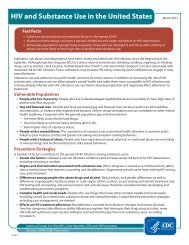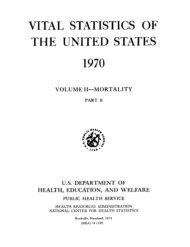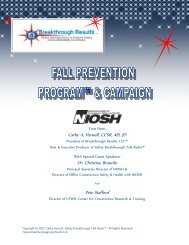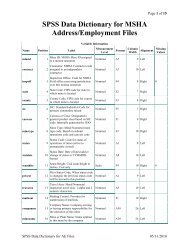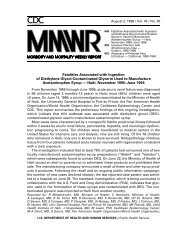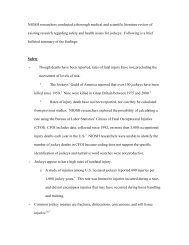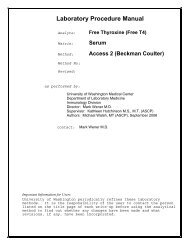Genital HPV Infection - Fact Sheet - Centers for Disease Control and ...
Genital HPV Infection - Fact Sheet - Centers for Disease Control and ...
Genital HPV Infection - Fact Sheet - Centers for Disease Control and ...
Create successful ePaper yourself
Turn your PDF publications into a flip-book with our unique Google optimized e-Paper software.
Recurrent respiratory papillomatosis (RRP) is very rare. It is estimated that about 820 children get juvenile-onset<br />
RRP every year in the U.S.<br />
What is the difference between <strong>HPV</strong> <strong>and</strong> HIV?<br />
<strong>HPV</strong> is a different virus than HIV, <strong>and</strong> causes different health problems. <strong>HPV</strong> does not live in the blood cells, but rather<br />
lives on the skin. Also, whereas HIV can lead to AIDS, genital <strong>HPV</strong> can lead to genital warts <strong>and</strong> certain types of cancer.<br />
However, persons with HIV are more likely to get <strong>HPV</strong> <strong>and</strong> to develop health problems from <strong>HPV</strong>. This is especially true<br />
<strong>for</strong> anal cancer.<br />
Does <strong>HPV</strong> affect a pregnant woman <strong>and</strong> her baby?<br />
Women who are pregnant can get infected with <strong>HPV</strong>. Usually these infections do not cause any problems.<br />
But sometimes<br />
••<br />
<strong>HPV</strong> leads to genital warts, which can grow during pregnancy. Women with genital warts during the late stages<br />
of pregnancy are more likely to have children with warts in the throat, a condition called recurrent respiratory<br />
papillomatosis; however, this is a very rare condition.<br />
••<br />
Pregnant women can develop cervical cell changes due to <strong>HPV</strong>. These changes can be detected through routine<br />
cervical cancer screening. Women should get routine cervical cancer screening, even during pregnancy.<br />
Is there a test <strong>for</strong> <strong>HPV</strong>?<br />
<strong>HPV</strong> tests are available to help screen women aged 30 years <strong>and</strong> older <strong>for</strong> cervical cancer. These <strong>HPV</strong> tests are not<br />
recommended to screen men, adolescents, or women under the age of 30 years. There is no general <strong>HPV</strong> test <strong>for</strong><br />
men or women to check one’s overall “<strong>HPV</strong> status.” Also, there is not an approved <strong>HPV</strong> test to find <strong>HPV</strong> in the mouth<br />
or throat.<br />
How can <strong>HPV</strong> be prevented?<br />
There are several ways that people can lower their chances of getting <strong>HPV</strong>:<br />
••<br />
<strong>HPV</strong> vaccines are recommended <strong>for</strong> 11- or 12-year-old boys <strong>and</strong> girls. <strong>HPV</strong> vaccines are safe <strong>and</strong> effective, <strong>and</strong><br />
can protect males <strong>and</strong> females against some of the most common types of <strong>HPV</strong> that can lead to disease <strong>and</strong><br />
cancer. <strong>HPV</strong> vaccines are given in three shots over six months; it is important to get all three doses to get<br />
the best protection. Boys <strong>and</strong> girls at ages 11 or 12 are most likely to have the best protection provided by<br />
<strong>HPV</strong> vaccines, <strong>and</strong> their immune response to vaccine is better than older women <strong>and</strong> men.<br />
––<br />
Girls <strong>and</strong> women: Two vaccines (Cervarix <strong>and</strong> Gardasil) are available to protect females against the types of<br />
<strong>HPV</strong> that cause most cervical cancers. One of these vaccines (Gardasil) also protects against most genital warts,<br />
<strong>and</strong> has been shown to protect against anal, vaginal, <strong>and</strong> vulvar cancers. Either vaccine is recommended <strong>for</strong><br />
11- <strong>and</strong> 12-year-old girls, <strong>and</strong> <strong>for</strong> females 13 through 26 years of age who did not get any or all of the shots<br />
when they were younger. These vaccines can also be given to girls beginning at 9 years of age.<br />
––<br />
Boys <strong>and</strong> men: One vaccine (Gardasil) is available to protect males against most genital warts <strong>and</strong> anal<br />
cancers. Gardasil is recommended <strong>for</strong> 11- <strong>and</strong> 12-year-old boys, <strong>and</strong> <strong>for</strong> males 13 through 21 years of age<br />
who did not get any or all of the shots when they were younger. Gay, bisexual, <strong>and</strong> other men who have sex<br />
with men should receive the vaccine through age 26 years. Males 22–26 years of age may also get the vaccine.<br />
••<br />
For those who choose to be sexually active, condoms may lower the risk of <strong>HPV</strong>. Condoms may also lower the<br />
risk of developing <strong>HPV</strong>-related diseases, such as genital warts <strong>and</strong> cervical cancer. To be most effective, condoms<br />
should be used with every sex act, from start to finish. <strong>HPV</strong> can infect areas that are not covered by a condom –<br />
so condoms may not fully protect against <strong>HPV</strong>.<br />
••<br />
People can also lower their chances of getting <strong>HPV</strong> by being in a faithful relationship with one partner; limiting<br />
their number of sex partners; <strong>and</strong> choosing a partner who has had no or few prior sex partners. But even people<br />
with only one lifetime sex partner can get <strong>HPV</strong>, <strong>and</strong> it may not be possible to determine if a person who has been<br />
sexually active in the past is currently infected. Because <strong>HPV</strong> is so common, <strong>and</strong> almost every sexually-active<br />
person will get <strong>HPV</strong> at some time in their lives, it is important to protect against the possible health effects of <strong>HPV</strong>.<br />
Can people prevent health problems caused by <strong>HPV</strong>?<br />
Yes, there are different prevention strategies <strong>for</strong> different health problems caused by <strong>HPV</strong>. <strong>HPV</strong> vaccines can prevent<br />
many diseases <strong>and</strong> cancers caused by <strong>HPV</strong>. In addition to vaccination, there are other ways to lower the risk of health<br />
problems caused by <strong>HPV</strong>.<br />
A person can lower their risk of<br />
••<br />
Cervical cancer by getting routine screening if they are a woman aged 21–65 years (<strong>and</strong> following up on any<br />
abnormal results);<br />
••<br />
Oropharyngeal cancers by avoiding tobacco <strong>and</strong> limiting alcohol intake; <strong>and</strong><br />
••<br />
<strong>Genital</strong> warts by using condoms all the time <strong>and</strong> the right way.<br />
Is there a treatment <strong>for</strong> <strong>HPV</strong> or health problems caused by <strong>HPV</strong>?<br />
There is no treatment <strong>for</strong> the virus itself, but there are treatments <strong>for</strong> the health problems that <strong>HPV</strong> can cause:<br />
••<br />
<strong>Genital</strong> warts can be removed with treatments applied by the provider or the person himself/herself. No one<br />
treatment is better than another. Some people choose not to treat warts, but to see if they disappear on their<br />
own. If left untreated, genital warts may go away, stay the same, or grow in size or number.<br />
••<br />
Cervical cancer is most treatable when it is diagnosed <strong>and</strong> treated early. Women who get routine Pap tests <strong>and</strong><br />
follow up as needed can identify problems be<strong>for</strong>e cancer develops. Prevention is always better than treatment.<br />
For more in<strong>for</strong>mation visit www.cancer.org.<br />
••<br />
Other <strong>HPV</strong>-related cancers are also more treatable when diagnosed <strong>and</strong> treated early. For more in<strong>for</strong>mation<br />
visit www.cancer.org.<br />
••<br />
Recurrent respiratory papillomatosis (RRP) can be treated with surgery or medicines. Curing RRP can<br />
sometimes require many treatments or surgeries over a period of years.<br />
Where can I get<br />
more in<strong>for</strong>mation?<br />
STD in<strong>for</strong>mation<br />
http://www.cdc.gov/std/<br />
<strong>HPV</strong> In<strong>for</strong>mation<br />
http://www.cdc.gov/hpv/<br />
<strong>HPV</strong> Vaccination<br />
http://www.cdc.gov/vaccines/vpd-vac/hpv/<br />
Cancer In<strong>for</strong>mation<br />
http://www.cdc.gov/cancer/<br />
Cervical Cancer Screening<br />
http://www.cdc.gov/cancer/cervical/basic_<br />
info/screening.htm<br />
CDC’s National Breast <strong>and</strong> Cervical Cancer Early<br />
Detection Program<br />
http://www.cdc.gov/cancer/nbccedp/<br />
CDC-INFO Contact Center<br />
1-800-CDC-INFO (1-800-232-4636)<br />
TTY: (888) 232-6348<br />
CDC National Prevention In<strong>for</strong>mation Network<br />
(NPIN)<br />
http://www.cdcnpin.org/scripts/index.asp<br />
P.O. Box 6003<br />
Rockville, MD 20849-6003<br />
E-mail: info@cdcnpin.org<br />
National <strong>HPV</strong> <strong>and</strong> Cervical Cancer Prevention<br />
Resource Center American Sexual Health<br />
Association (ASHA)<br />
http://www.ashastd.org/std-sti/hpv.html<br />
P. O. Box 13827<br />
Research Triangle Park, NC 27709-3827<br />
1-800-783-9877




